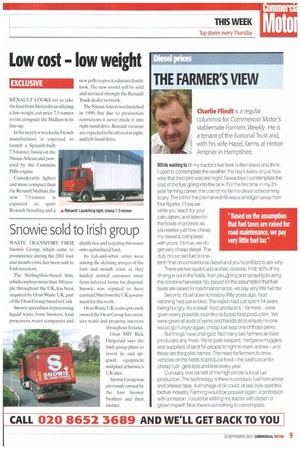Diesel prices
Page 9

If you've noticed an error in this article please click here to report it so we can fix it.
THE FARMER'S VIEW
Charlie Flindt is a regular columnist for Commercial Motor's stablemate Farmers Weekly. He is a tenant of the National Trust and, with his wife Hazel, farms at Hinton Ampner in Hampshire.
While waiting to fill my tractor's fuel tank I often stand and think. I used to contemplate the weather, the days tasks, or just how wise that third pint was last night. Nowadaysl contemplate the cost of the fuel going into the tank. For the f irst time in my 21year farming career, the cost of my farm's diesel is becoming scary. The bill for the pre-harvest fill was a smidgen away from four figures. I'll pause while you reach for your calculators, and listen for the howls of protests as you realise just how cheap my diesel is compared with yours. It's true, we do get very cheap diesel. The duty on our red fuel is onetenth that on conventional diesel and you're entitled to ask why.
There are two quaint and archaic reasons. First, 90% of my driving is out in the fields, from ploughing and spraying to using the combine harvester. So, based on the assumption that fuel taxes are raised for road maintenance, we pay very little fuel tax.
Second, it's all down to history. Fifty years ago, food rationing had just ended. The nation had just spent 14 years being hungry. As a result, food producers -farmers -were given every possible incentive to boost food production. We were given all sorts of perks and handouts to ensure no-one would go hungry again; cheap fuel was one of those perks.
But things have changed. Not many see farmers as food producers any more. We're park-keepers, hedgerow huggers and suppliers of land for people to right-to-roam acrossand those are the polite names. The need for farmers to drive vehicles on the fields to produce food -the justification for cheap fuelgets less and less every year.
Curiously, one benefit of the high prices is local fuel production. The technology is there to produce fuel from wheat and oilseed rape. A shortage of oil could, at last, kick-start this biofuel industry. Farming would be popular again: a profession with a mission. I could be refilling my tractor with diesel I'd grown myself. Now there's something to contemplate.
"Based on the assumption that fuel taxes are raised for road maintenance, we pay very little fuel tax"










































































































































































































